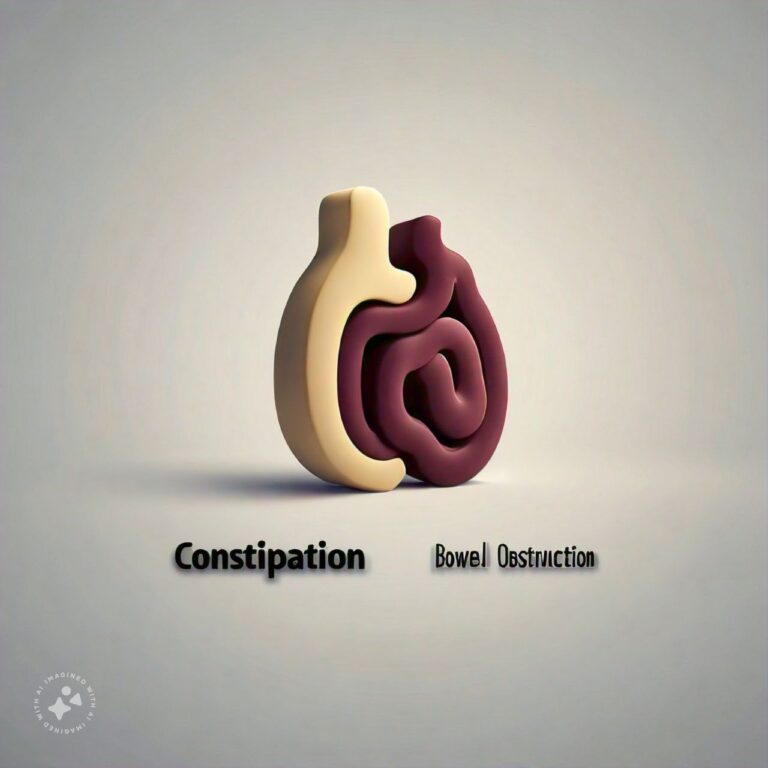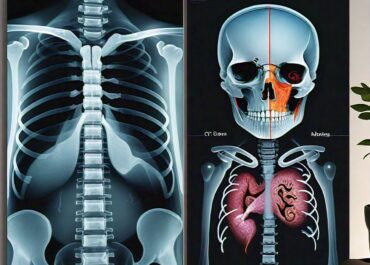
Differences Between Constipation and Bowel Obstruction
When it comes to digestive health, issues related to bowel movements are common, with constipation and bowel obstruction being two of the more prevalent conditions that affect the gastrointestinal system. Both conditions involve difficulty in passing stools, but they differ in their causes, severity, and treatments. While constipation is generally a less severe and more common condition, bowel obstruction can be a serious and potentially life-threatening medical emergency that requires immediate attention.
Understanding the difference between constipation and bowel obstruction is crucial for appropriate diagnosis and treatment. Constipation usually results from slow-moving stool through the intestines, whereas bowel obstruction occurs when there is a physical blockage in the intestines that prevents the passage of food, gas, and fluids.
Constipation Overview
What is Constipation?
Constipation is a common gastrointestinal condition in which an individual experiences infrequent, difficult, or painful bowel movements. A person with constipation may have fewer than three bowel movements per week, or they may feel that their bowel movements are incomplete or hard to pass. In most cases, constipation is not a serious condition, but it can cause discomfort and may interfere with daily life. Chronic constipation can lead to complications, such as hemorrhoids, anal fissures, or fecal impaction.
Constipation is typically caused by lifestyle factors, such as poor diet, lack of physical activity, or dehydration, but it can also result from underlying medical conditions, such as hypothyroidism, irritable bowel syndrome (IBS), or medications.
Key Characteristics of Constipation
- Infrequent Bowel Movements: People with constipation may have fewer than three bowel movements per week. In severe cases, a person may go several days or even weeks without passing stool.
- Hard, Dry Stools: When stool stays in the colon for an extended period, it can become hard and dry, making it difficult and painful to pass. This is a hallmark of constipation.
- Straining During Bowel Movements: Many people with constipation report excessive straining or a sensation that their bowel movements are incomplete.
- Abdominal Discomfort: Constipation often causes bloating, cramping, or a sense of fullness in the abdomen, which can be uncomfortable and persistent.
- Caused by Lifestyle Factors: Constipation is often linked to poor diet (especially a lack of fiber), dehydration, lack of exercise, and changes in routine. It can also be a side effect of certain medications or medical conditions.
Causes of Constipation
- Low Fiber Diet: A diet that is low in fiber can slow down digestion and make it harder to pass stool. Fiber adds bulk to the stool, which helps it move through the intestines more easily.
- Dehydration: Not drinking enough water can cause the stool to become dry and hard, making it more difficult to pass. Proper hydration is essential for regular bowel movements.
- Sedentary Lifestyle: Lack of physical activity can contribute to constipation. Regular exercise helps stimulate bowel movements by promoting muscle contractions in the intestines.
- Medications: Certain medications, such as opioids, antacids containing calcium or aluminum, and some antidepressants, can cause constipation as a side effect.
- Medical Conditions: Underlying medical conditions, such as hypothyroidism, irritable bowel syndrome (IBS), diabetes, and neurological disorders, can lead to chronic constipation.
- Ignoring the Urge: Ignoring the urge to have a bowel movement can result in stool becoming harder to pass. Over time, this can lead to chronic constipation.
Treatment for Constipation
- Dietary Changes: Increasing fiber intake by eating more fruits, vegetables, whole grains, and legumes can help alleviate constipation. Fiber supplements can also be used.
- Hydration: Drinking plenty of water is essential for softening the stool and promoting regular bowel movements.
- Exercise: Regular physical activity can stimulate intestinal contractions, helping to move stool through the intestines.
- Over-the-Counter Laxatives: Laxatives, stool softeners, or fiber supplements can provide short-term relief from constipation. However, they should not be used as a long-term solution without consulting a doctor.
- Medical Treatment: In cases of chronic constipation caused by an underlying medical condition, a doctor may prescribe medication or recommend further testing.
Complications of Constipation
- Hemorrhoids: Straining during bowel movements can lead to the development of hemorrhoids, which are swollen veins in the rectum and anus that cause pain, itching, and bleeding.
- Anal Fissures: Passing hard stool can cause small tears in the skin around the anus, known as anal fissures, which can be painful.
- Fecal Impaction: In severe cases, stool can become so hard and dry that it becomes impacted, requiring medical intervention to remove it.
- Rectal Prolapse: Chronic straining during bowel movements can lead to rectal prolapse, where part of the rectum protrudes outside the anus.
Bowel Obstruction Overview
What is Bowel Obstruction?
Bowel obstruction occurs when there is a blockage in the intestines that prevents the normal passage of food, fluids, and gas through the digestive tract. This blockage can be caused by a variety of factors, including scar tissue (adhesions), tumors, hernias, or impacted stool. Bowel obstruction can occur in either the small intestine or the large intestine (colon).
Bowel obstruction is a serious condition that requires immediate medical attention. If left untreated, it can lead to life-threatening complications, such as tissue death (necrosis) in the intestines, perforation, or infection (peritonitis). Unlike constipation, which is usually caused by slow movement of stool, bowel obstruction involves a physical blockage that must be removed or treated to restore normal bowel function.
Key Characteristics of Bowel Obstruction
- Inability to Pass Stool or Gas: A complete bowel obstruction can cause a total inability to pass stool or gas. In a partial obstruction, the individual may still pass small amounts of stool or gas.
- Severe Abdominal Pain: The pain associated with bowel obstruction is typically crampy, severe, and comes in waves. The pain may be accompanied by bloating and a feeling of fullness.
- Nausea and Vomiting: Nausea and vomiting are common symptoms of bowel obstruction, especially if the blockage is in the small intestine. Vomiting may include undigested food or even bile.
- Abdominal Distention: A blocked intestine causes gas and fluids to build up behind the obstruction, leading to noticeable swelling or distention of the abdomen.
- Caused by Physical Blockages: Unlike constipation, bowel obstruction is caused by physical blockages such as tumors, scar tissue, or twisted intestines (volvulus).
Causes of Bowel Obstruction
- Adhesions: Adhesions are bands of scar tissue that can form after abdominal surgery or inflammation. These bands can bind the intestines together or to other structures, causing blockages.
- Hernias: A hernia occurs when part of the intestine protrudes through a weak spot in the abdominal muscles. The protruded section can become pinched or trapped, leading to a blockage.
- Tumors: Both benign and malignant tumors can grow in the intestines and cause blockages. Tumors are a more common cause of bowel obstruction in individuals with colon cancer.
- Intestinal Volvulus: Volvulus occurs when a loop of the intestine twists around itself, cutting off the blood supply and causing an obstruction. It is a medical emergency that requires surgery.
- Intussusception: Intussusception is a condition in which one part of the intestine slides into an adjacent section, much like a telescope folding in on itself. This can block the flow of material through the intestine and cut off the blood supply.
- Impacted Stool: Severe constipation or fecal impaction can sometimes lead to bowel obstruction, especially in older adults or individuals with mobility issues.
Treatment for Bowel Obstruction
- Hospitalization: Bowel obstruction often requires hospitalization to monitor the patient's condition and prevent complications. Intravenous fluids and electrolytes are typically given to prevent dehydration.
- Nasogastric Tube: A nasogastric tube may be inserted through the nose and into the stomach to remove fluid and gas buildup, relieving pressure and discomfort.
- Surgery: In many cases, bowel obstruction requires surgery to remove the blockage, especially if it is caused by adhesions, tumors, or volvulus. Surgery is also needed if there is a risk of perforation or tissue death.
- Non-Surgical Treatment: In some cases, particularly with partial obstructions, non-surgical methods such as bowel rest, enemas, or medications may be used to relieve the blockage.
- Colonoscopy: If the obstruction is in the colon, a colonoscopy may be performed to remove the blockage or determine its cause.
Complications of Bowel Obstruction
- Tissue Death (Necrosis): If the blood supply to the intestines is cut off due to a blockage, the affected tissue can die, leading to a medical emergency.
- Perforation: A blockage can cause the intestine to rupture or tear, allowing bacteria and waste to spill into the abdominal cavity. This can lead to a serious infection known as peritonitis.
- Sepsis: If an infection such as peritonitis spreads into the bloodstream, it can result in sepsis, a life-threatening condition that requires immediate medical treatment.
- Strangulation: In some cases of obstruction, the intestines may become strangulated, meaning the blood supply is cut off. This can cause severe damage and requires emergency surgery.
Differences Between Constipation and Bowel Obstruction
- Severity:
- Constipation: Usually not life-threatening and can often be resolved with lifestyle changes, over-the-counter treatments, or medications.
- Bowel Obstruction: A serious and potentially life-threatening condition that requires immediate medical attention and often surgery.
- Cause:
- Constipation: Typically caused by lifestyle factors such as a low-fiber diet, dehydration, or lack of exercise.
- Bowel Obstruction: Caused by a physical blockage in the intestines, such as tumors, adhesions, or twisted intestines.
- Symptoms:
- Constipation: Includes infrequent bowel movements, hard stools, straining during bowel movements, and bloating.
- Bowel Obstruction: Symptoms include severe crampy abdominal pain, inability to pass stool or gas, nausea, vomiting, and abdominal distention.
- Treatment:
- Constipation: Can often be treated with dietary changes, hydration, exercise, and over-the-counter laxatives.
- Bowel Obstruction: Usually requires hospitalization and may need surgery to remove the blockage.
- Risk Factors:
- Constipation: Common risk factors include poor diet, sedentary lifestyle, and certain medications.
- Bowel Obstruction: Risk factors include abdominal surgeries, tumors, hernias, and conditions like Crohn's disease.
Conclusion
In summary, while constipation and bowel obstruction both involve difficulty with bowel movements, they are fundamentally different conditions with distinct causes, symptoms, and treatments. Constipation is a common and generally non-life-threatening condition often related to lifestyle factors like diet and hydration. It can usually be treated with dietary changes, exercise, and over-the-counter remedies.
Bowel obstruction, on the other hand, is a serious medical emergency caused by a physical blockage in the intestines that can result in severe complications if left untreated. Immediate medical intervention is necessary to prevent potentially life-threatening issues such as tissue death, perforation, and infection.
Understanding the differences between these two conditions is essential for identifying symptoms, seeking appropriate treatment, and maintaining digestive health. For those experiencing ongoing digestive issues, it is important to consult a healthcare provider for a proper diagnosis and management plan.
FAQs
Related Topics
- All
- Animals
- Diseases
- Health
- Money
- Politics
© 2024 OnYelp.com. All rights reserved. Terms and Conditions | Contact Us | About us





